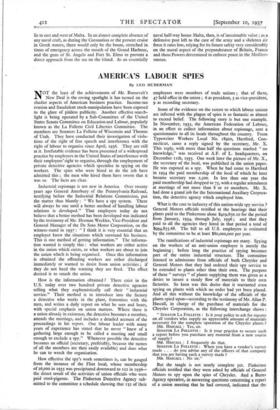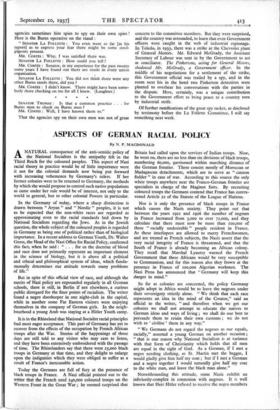AMERICA'S LABOUR SPIES
By LEO HLTBERMAN
NOT the least of the achievements of Mr. Roosevelt's New Deal is the roving spotlight it has turned on the shadier aspects of American business practice. Income-tax evasion and fraudulent stock-manipulation have been exposed to the glare of pitiless publicity. Another effective search- light is being operated by a Sub-Committee of the United States Senate Committee on Education and Labour, popularly known as the La Follette Civil Liberties Committee. The members are Senators La Follette of Wisconsin and Thomas of Utah. They have conducted their investigation of viola- tions of the right of free speech and interference with the right of labour to organise since April, 1936. They are still at it. Irrefutable evidence has been presented of a widespread practice by employers in the United States of interference with their employees' right to organise, through the employment of private detective agencies which specialise in spying on the workers. The spies who were hired to do the job have admitted this ; the men who hired them have sworn that it was so. The facts are clear.
Industrial espionage is not new in America. Over twenty years ago General Atterbury of the Pennsylvania Railroad, testifying before the Industrial Relations Commission, put the matter thus bluntly : " We have a spy system. There will always be one until a better method of handling labour relations is developed." That employers today do not believe that a better method has been developed was indicated by the testimony of Mr. Herman Weckler, Vice-President and General Manager of the De Soto Motor Corporation, on the witness-stand in 1937 : " I think it is very essential that an employer know the situations which surround his business. This is one method of getting information." The informa- tion wanted is simply this : what workers are either active in the union which exists, or what workers are about to join the union which is being organised. Once this information is obtained the offending workers are either discharged immediately or warned to desist from union activities ; if they do not heed the warning they are fired. The effect desired is to smash the union.
How is the information obtained ? There exist in the U.S. today over two hundred private detective agencies selling what they euphemistically call their "industrial service." Their method is to introduce into the factory a detective who works in the plant, fraternises with the men, and writes a daily report on what he sees and hears, with special emphasis on union matters. Where there is a union already in existence, the detective becomes a member, attends the meetings, and includes a detailed account of the proceedings in his report. One labour leader with many years of experience has stated that he never "knew of a gathering large enough to be called a meeting and small enough to exclude a spy." Whenever possible the detective becomes an official (secretary, prefeiably, because the names of all the members are then easily available) and does what he can to wreck the organisation.
How effective the spy's work sometimes is, can be gauged from the instance of the Flint local, whose membership of 26,000 in 1935 was precipitated downward to 122 in 1936— the direct result of the activities of union officials who were paid stool-pigeons. The Pinkerton Detective Agency sub- mitted to the committee a schedule showing that 132 of their employees were members of trade unions ; that of these, 47 held office in the union ; 6 as president, 5 as vice-president, 9 as recording secretary.
Some of the evidence on the extent to which labour unions are infected with the plague of spies is so fantastic as almost to exceed belief. The following story is but one example. In November, 1935, the American Federation of Labour, in an effort to collect information about espionage, sent a questionnaire to all its locals throughout the country. From Typewriter Workers Local No. 18920, Hartford, Con- necticut, came a reply signed by the secretary, Mr. X. This reply, with more than half the questions marked "no knowledge," was received at A.F. of L. headquarters, on December It th, 1935. One week later the picture of Mr. X., the secretary of the local, was published in the union paper. He was exposed as a spy. When he had come to Hartford in 1934 the paid membership of the local of which he later became secretary was 2,500. In less than one year the paid membership had dropped to 75, with a regular attendance at meetings of not more than 8 or to members. Mr. X. had done a grand job for the International Auxiliary Corpora- tion, the detective agency which employed him.
What is the cost to industry of this nation-wide spy service ? General Motors officials testified at the hearings that their plants paid to the Pinkertons alone $419,850.10 for the period from January, 1934, through July, 1936; and that they paid to all the agencies they hired in that period a total of $994,855.68. The bill to all U.S. employers is estimated by the committee to be at least $8o,000,000 per year.
The ramifications of industrial espionage are many. Spying on the workers of an anti-union employer is merely the beginning ; before long the practice of spying becomes part of the entire industrial structure. The committee listened to admissions from officials of both Chrysler and General Motors that they had ordered their spy service to be extended to plants other than their own. The purpose of these " surveys " of plants supplying them was given as a desire to insure a steady flow of materials to their own factories. So keen was this desire that it warranted even spying on plants with which no order had yet been placed. And all this without the knowledge of the officials of the plants spied upon—according to the testimony of Mr. Allan P. Hascall, in charge of the purchase of materials for the Chrysler Corporation, as the following interchange shows : "SENATOR LA FOLLETTE : IS it your policy to ask for reports on all vendors who supply an appreciable amount of materials necessary for the complete operation of the Chrysler plants ?
MR. HASC.ALL : Yes, sir.
SENATOR LA FOLLETTE : IS it your practice to secure such a report before you purchase any material from a new source of supply?
Mn. HASCALL : I frequently do that.
SENATOR LA FoLLErrE : When you have a vendor's survey made . . . do you advise any of the officers of that company that you are having such a survey made ?
MR. HASC.ALL : No sir."
But the tangle is not nearly complete yet. Pinkerton officials testified that they were asked by officials of General Motors to spy upon the spies of Chrysler. And a Burns Agency operative, in answering questions concerning a report of a union meeting that he had covered, indicated that the agencies sometimes hire spies to spy on their own spies ! Here is the Burns operative on the stand : "SENATOR LA FOLLEt ih : You even went so far [in his
report] as to express your fear there might be some stool- pigeons present.
MR. COATES : Why, I was satisfied there was.
SENATOR LA FOLLETTE : How could you tell ?
MR. CoNrEs : Senator, in my experience for the past twenty some years I have found out there are stools in every union organisation.
SENATOR LA FOLLETTE : You did not think there were any other Burns stools there, did you ?
MR. COATES : I didn't know. There might have been some- body there checking on me for all I knew. (Laughter.) SENATOR THOMAS: IS that a Common practice . . . for Burns men to check on Burns men ?
MR. COATES : Well, I have known them to."
That the agencies spy on their own men was not of great concern to the committee members. But they were surprised, and the country was astounded, to learn that even Government officers were caught in the web of industrial espionage. In Toledo, in 1935, there was a strike at the Chevrolet plant of General Motors. Mr. Edward McGrady, the Assistant Secretary of Labour was sent in by the Government to act as conciliator. The Pinkertons, acting for General Motors, shadowed Mr. McGrady, a Government officer. In the middle of his negotiations for a settlement of the strike, this Government official was trailed by a spy, and in the room next his in the hotel two Pinkerton detectives were planted to overhear his conversations with the parties in the dispute. Here, certainly, was a unique contribution to the Government effort to bring peace to a country torn by industrial strife.
Of further ramifications of the great spy racket, as disclosed by testimony before the La Follette Committee, I will say something next week.











































 Previous page
Previous page